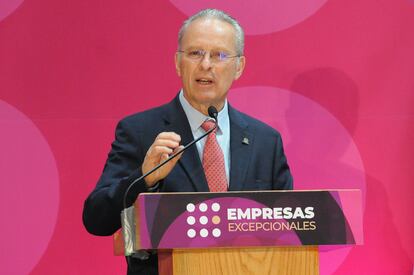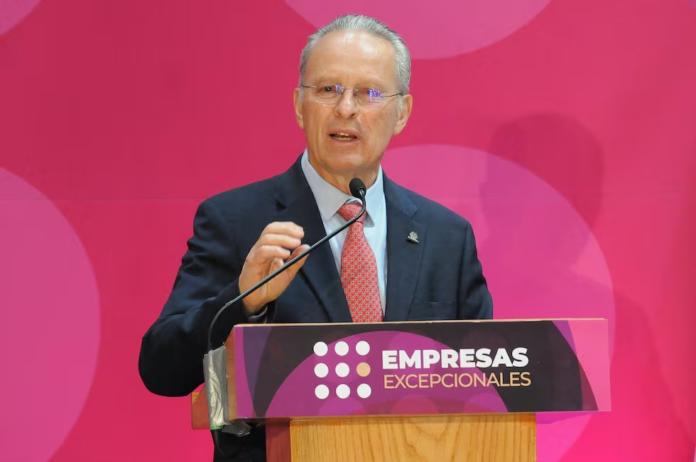
“Democracy in Mexico is at risk,” said José Medina Mora, president of the Employers’ Confederation of the Mexican Republic (Coparmex), in his message to the media on Wednesday afternoon. The press conference was announced hours after the National Electoral Institute (INE) proposed resolving the overrepresentation of the ruling party and its allies in Congress so that they obtain a qualified majority in the Chamber of Deputies. The coalition would be three votes away from achieving this in the Senate as well. Businessmen, who have been expressing themselves against this possibility for weeks, have raised the volume of their discontent.
“We call on the 11 INE counselors and the five magistrates of the Superior Chamber of the Electoral Tribunal of the Judicial Branch of the Federation, so that in this task so important and so decisive for the future of democracy in our country, they make a historical reading in which they find the objective of each of the modifications to the Constitution, where the participation of minorities is always guaranteed,” said Medina Mora. The business leader explained that the ruling on overrepresentation is linked to the controversial initiative to reform the Judicial Branch, which would pass without changes with relative ease. This reform, he said, is scaring away investment. The Court is expected to issue a ruling before August 30.
The initiative proposes replacing all judges and magistrates at the Federal level and electing them by popular vote. This has created nervousness in the private sector and in the markets, where it is perceived as a loss of counterweights and guarantees, which is why the exchange rate has depreciated 13% since the June 2 election. Medina Mora said that, if approved, the country should expect an outflow of capital and a further depreciation of the Mexican peso against the dollar. This is happening at a time when transnational companies are looking to move their factories from China to destinations more friendly to their target market, such as the United States and Europe. Mexico has emerged as an attractive alternative.
“We have advanced because as a country we decided that we wanted democracy and precisely for that reason we are facing this risk of a regression to the Mexico of the seventies,” said Medina Mora. “If the INE councilors this week and eventually the magistrates of the Electoral Tribunal decide to give a qualified majority to Morena and its allies, it means that they can approve the 18 constitutional reforms, including a fast track in September, plus whatever else they can think of… we are in two crucial weeks for the future of the country,” he added.
The leader shared that a foreign company, which was seeking to open two more factories than the one it already has in Ciudad Juárez (Chihuahua), opted to open them in Honduras in light of the increased uncertainty generated by the initiative of President Andrés Manuel López Obrador.
Medina Mora suggested that with its proposal to determine legislative representation, the INE had made an interpretation of the Constitution that benefits Morena and its allies. “It is not fair that some sections of article 54, such as the first, are based on a coalition to meet the requirement of having more than 200 deputies presented to the candidates for deputies in at least 200 districts, but then in the limits that the Constitution sets at a maximum of 8% of representation and a maximum of 300 deputies, it is taken literally by party. It seems to us that in the historical study it can be understood that the 8% limitation must be understood by party or coalition or political force,” he said.
On Wednesday, the markets reacted to the INE proposal by selling Mexican assets. The exchange rate fell 1.75% and reached 19.35 pesos per dollar. Since the June 2 election, the exchange rate has lost 13% of its value against the dollar. This week, two global investment banks have warned that investment risk in Mexico has increased due to the possibility of the judicial reform being approved.
Source: elpais






